湘鲁版四年级英语上册知识点汇总
湘鲁版英语四年级上册单词默写表
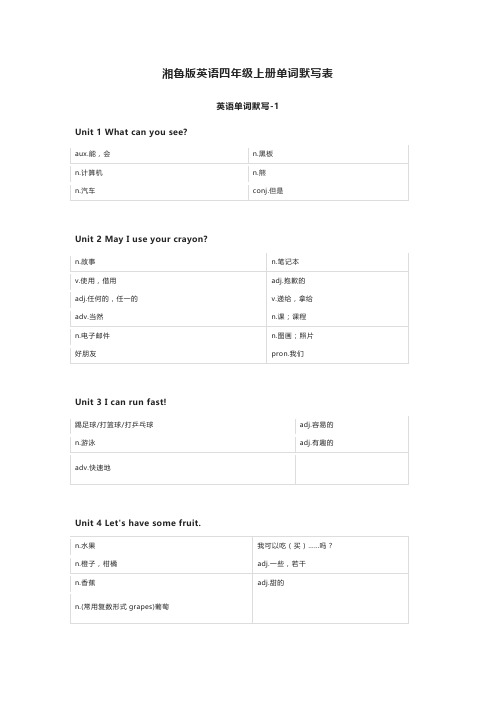
看一看
n.短袜
n.书店
n.衣服
n.照相机
n.野餐
一瓶……
Unit 7 What time is it?
……点钟
该去……的时候了
冬令营
几点了?
n.火车
n.车站
n.背包
在这里。
玩得高兴
n.票
n.时钟
n.座位
n.号码
对不起,打扰一下!
prep.在……时刻
上午
下午
Unit 8 Where are you from?
prep.来自
n.加拿大
n.印度
abbr.英国
n.中国
abbr.美国
n.马来西亚
n.日本
n.意大利
n.比萨饼
v.有(发出)……的气味
v.吃起来
n.榴莲
adj.不好的,糟糕的
Unit 9 What 今天
回家
v.谈话,交谈
v.想念
明年
v.(用颜料)画,绘
湘鲁版英语四年级上册单词默写表
英语单词默写-1
Unit 1 What can you see?
aux.能,会
n.黑板
n.计算机
n.熊
n.汽车
conj.但是
Unit 2 May I use your crayon?
n.故事
n.笔记本
v.使用,借用
adj.抱歉的
adj.任何的,任一的
v.递给,拿给
adv.当然
ice hockey[ais ˈhɔki]
ping-pong
rugby[ˈrʌgbi]
softball[ˈsɒftbɔ:l]
tennis[ˈtenɪs]
湘鲁版英语四年级上册复习二
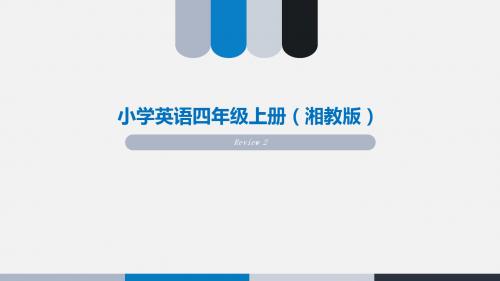
May I have some...?
May I have a/an...? Would you like...?Yes, please.No, thanks.
What would you like?I’ d like..., please.
I’ m hungry/thirsty.
教学活动
组织一次生日聚会活动(游戏)。Zhou Lin生日了,把几个好朋友请到家里。 餐桌上有各种食品、水果和饮料,请同学们吃,并询问每个人想要吃什么食 物和水果,喝什么饮料。
Attendant: Of course. Here you are.
Mum: Can I have a look at the shirt? Attendant: The yellow one? Mum: No, the red one.
Amy: Can I have a look at the blue socks, please?
小学英语四年级上册(湘教版)
Review 2
复习课教学目标
1.话题:能用第4~6单元的单词和句型谈论饮
食和购物。
2.功能:能听懂并会用所学内容询问和回答有
关饮食和购物的事情,掌握所学基本句型。
3.情感:引导学生注意饮食习惯,言谈举止文
明,保持身心健康。
复习课教学重点
1. Target vocabulary
(3)Mum和Amy在服装店的对话。
Mum: Wow, look! This is a cool shop. There are dresses, shirts and socks.
Amy: Let’ s go and have a look. Mum: OK. Attendant: May I help you? Amy: May I see the red dress, please?
湘鲁版英语四年级上册-2023年学习资料

单元教学目标-Unit 3-l can run fast!-■1.话题:能用本单元的单词和句型谈论体育项目-和体育活动。-■2.功能:能听懂所学内 ,并会用教学内容询问-Can you swim?-和回答擅长什么体育活动。-No,I can't!-■3.情感:培养学生热爱体育活动,注意锻炼身体 -拥有健康的体育爱好。-Yes.I can.-14 fourteen
Sec量ionA-①Look and listen-Can you swim?-■2.任务1的教学:-Can you play football? No,I can't!-■1教师向学生展示Look and listen的教-学挂图,让学生仔细看图中有哪些人物,分别-说了什么话,其中有哪几项运 。-Yes,I can.It's fun!-Yes,I can.It's easy!-2教师拿出短语和单词olay football,-What an you do?-Can you swim fast?-swim,easy,fast的卡片,教学生认读。-I can run fast!-3放 音,让学生注意听,看录音中的人-Good!-物都喜欢哪些体育活动。-·4再给学生放一遍录音,在学生基本听懂-2Listen,circle and ay-的基础上,让学生跟读。-L公-■(⑤)让学生打开书朗读后,根据课文中图片内-容相互进行对话练习。-16-sixteen
第1学时-■教学目标-■1.能用所学词语或句型谈论体育活动和爱好。-■2.能听懂并会用Can you...?Yes,Ican.No,Ican't. 句型进行问答。-■3.培养学生健康向上的体育爱好。-■教学内容-单词:play football easy swim fun fast-句型:Ca you play football?-Yes,I can.It's easy!-Can you swim?-No,I can't.-What c n you do?-I can run fast!
鲁教版英语小学四年级上册综合复习知识归类
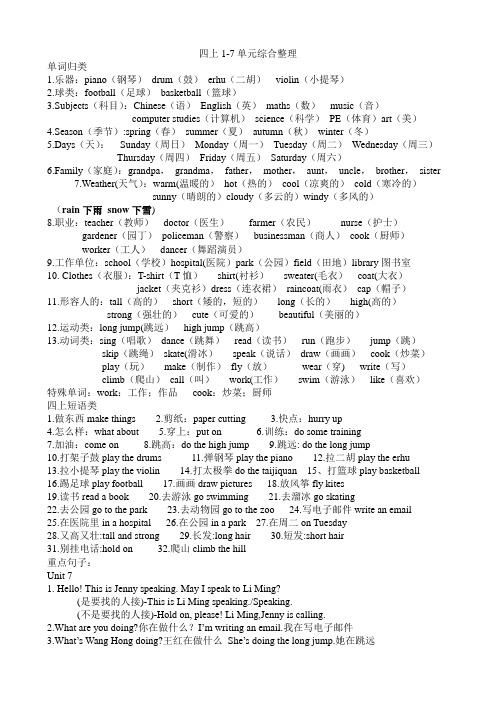
四上1-7单元综合整理单词归类1.乐器:piano(钢琴)drum(鼓)erhu(二胡)violin(小提琴)2.球类:football(足球)basketball(篮球)3.Subjects(科目):Chinese(语)English(英)maths(数)music(音)computer studies(计算机)science(科学)PE(体育)art(美)4.Season(季节):spring(春)summer(夏)autumn(秋)winter(冬)5.Days(天):Sunday(周日)Monday(周一)Tuesday(周二)Wednesday(周三)Thursday(周四)Friday(周五)Saturday(周六)6.Family(家庭):grandpa,grandma,father,mother,aunt,uncle,brother,sister7.Weather(天气):warm(温暖的)hot(热的)cool(凉爽的)cold(寒冷的)sunny(晴朗的)cloudy(多云的)windy(多风的)(rain下雨snow下雪)8.职业:teacher(教师)doctor(医生)farmer(农民)nurse(护士)gardener(园丁)policeman(警察)businessman(商人)cook(厨师)worker(工人)dancer(舞蹈演员)9.工作单位:school(学校)hospital(医院)park(公园)field(田地)library图书室10. Clothes(衣服):T-shirt(T恤)shirt(衬衫)sweater(毛衣)coat(大衣)jacket(夹克衫)dress(连衣裙)raincoat(雨衣)cap(帽子)11.形容人的:tall(高的)short(矮的,短的)long(长的)high(高的)strong(强壮的)cute(可爱的)beautiful(美丽的)12.运动类:long jump(跳远)high jump(跳高)13.动词类:sing(唱歌)dance(跳舞)read(读书)run(跑步)jump(跳)skip(跳绳)skate(滑冰)speak(说话)draw(画画)cook(炒菜)play(玩)make(制作)fly(放)wear(穿) write(写)climb(爬山)call(叫)work(工作)swim(游泳)like(喜欢)特殊单词:work:工作;作品cook:炒菜;厨师四上短语类1.做东西make things2.剪纸:paper cutting3.快点:hurry up4.怎么样:what about5.穿上:put on6.训练:do some training7.加油:come on 8.跳高:do the high jump 9.跳远: do the long jump10.打架子鼓play the drums 11.弹钢琴play the piano 12.拉二胡play the erhu13.拉小提琴play the violin 14.打太极拳do the taijiquan 15、打篮球play basketball 16.踢足球play football 17.画画draw pictures 18.放风筝fly kites19.读书read a book 20.去游泳go swimming 21.去溜冰go skating22.去公园go to the park 23.去动物园go to the zoo 24.写电子邮件write an email25.在医院里in a hospital 26.在公园in a park 27.在周二on Tuesday28.又高又壮:tall and strong 29.长发:long hair 30.短发:short hair31.别挂电话:hold on 32.爬山climb the hill重点句子:Unit 71. Hello! This is Jenny speaking. May I speak to Li Ming?(是要找的人接)-This is Li Ming speaking./Speaking.(不是要找的人接)-Hold on, please! Li Ming,Jenny is calling.2.What are you doing?你在做什么?I’m writing an email.我在写电子邮件3.What’s Wang Hong doing?王红在做什么She’s doing the long jump.她在跳远4. What’s Danny doing? 丹尼在做什么?He’s doing the high jump.他在跳高5. What’s Guo Yang doing?郭阳在做什么?He’s running.他在跑步6. Shall we go and play basketball?我们去打篮球好吗?OK/Sorry. I’m writing an email.好的/对不起,我在写电子邮件7. Can he see the pictures ?他能看到这些照片吗?Yes, he can./ No, he can’t.能/不能8. May I have a look?我可以看看吗?Sure.当然可以。
湘鲁版四年级英语上册知识点汇总

四(上)Unit 1 What can you see ?一、单词:classroom 教室computer 电脑blackboard 黑板see 看见can 能够bear 熊car 小汽车二、重点句子What can you see? 你能看见什么?I can see …我能看见…Is there a/an … ? 有一个…吗?Yes, there is. 是的,有。
/ No, there isn’t. 不,没有。
三、对话Andy : This is our new classroom.Wang Li : Andy .What can you see ?Andy: I can see a blackbord.Wang Li:What can you see?Andy: I can see many desks.Wang Li: Is there a computer ?Andy : Yes, there is.四(上)Unit 2 May I use your crayon?一、单词lesson 课程story 故事notebook笔记本give给may 可以use 使用sure 当然email 电子邮件picture 图片good friennds 好朋友二、重点句子May I use your … ? 我能用你的… ?Sure. Here you are. 当然。
给你。
Sorry. I don’t have a/ an / any .. 对不起,我没有…Let’s write a story. 让我们写一个故事吧。
Let’s make a card. 让我们做一张卡片吧。
三、对话A: Let’s write a story.B: Ok. Do you have a notebook?A: Yes, I do.B :May I use your pen?A: Sorry, I don’t have a pen.B: May I use your caryon ?A: Sure. Here you are.B: Thank you.四(上)Unit 3 I can run fast.一、单词play 玩,打football 足球play football 踢足球swim 游泳easy 容易fast 快的fun 有趣的can’t= can not不能二、重点句子Can you … ? 你能… ?Yes, I can. 我能/No, I can’t. 我不能。
鲁科版四上英语知识点归纳
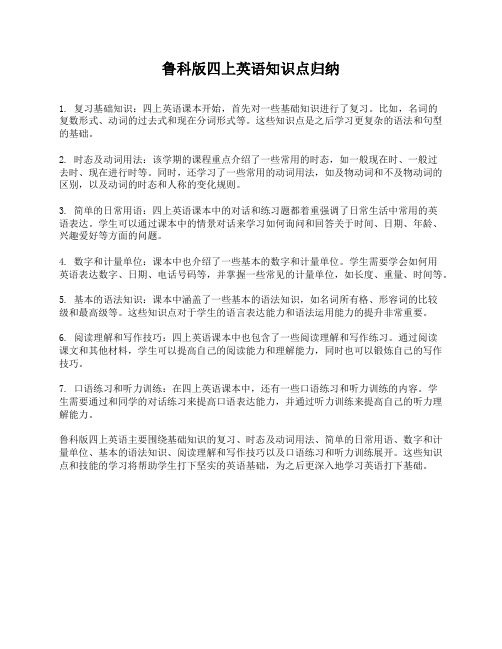
鲁科版四上英语知识点归纳1. 复习基础知识:四上英语课本开始,首先对一些基础知识进行了复习。
比如,名词的复数形式、动词的过去式和现在分词形式等。
这些知识点是之后学习更复杂的语法和句型的基础。
2. 时态及动词用法:该学期的课程重点介绍了一些常用的时态,如一般现在时、一般过去时、现在进行时等。
同时,还学习了一些常用的动词用法,如及物动词和不及物动词的区别,以及动词的时态和人称的变化规则。
3. 简单的日常用语:四上英语课本中的对话和练习题都着重强调了日常生活中常用的英语表达。
学生可以通过课本中的情景对话来学习如何询问和回答关于时间、日期、年龄、兴趣爱好等方面的问题。
4. 数字和计量单位:课本中也介绍了一些基本的数字和计量单位。
学生需要学会如何用英语表达数字、日期、电话号码等,并掌握一些常见的计量单位,如长度、重量、时间等。
5. 基本的语法知识:课本中涵盖了一些基本的语法知识,如名词所有格、形容词的比较级和最高级等。
这些知识点对于学生的语言表达能力和语法运用能力的提升非常重要。
6. 阅读理解和写作技巧:四上英语课本中也包含了一些阅读理解和写作练习。
通过阅读课文和其他材料,学生可以提高自己的阅读能力和理解能力,同时也可以锻炼自己的写作技巧。
7. 口语练习和听力训练:在四上英语课本中,还有一些口语练习和听力训练的内容。
学生需要通过和同学的对话练习来提高口语表达能力,并通过听力训练来提高自己的听力理解能力。
鲁科版四上英语主要围绕基础知识的复习、时态及动词用法、简单的日常用语、数字和计量单位、基本的语法知识、阅读理解和写作技巧以及口语练习和听力训练展开。
这些知识点和技能的学习将帮助学生打下坚实的英语基础,为之后更深入地学习英语打下基础。
四年级上册湘教版英语知识点汇总
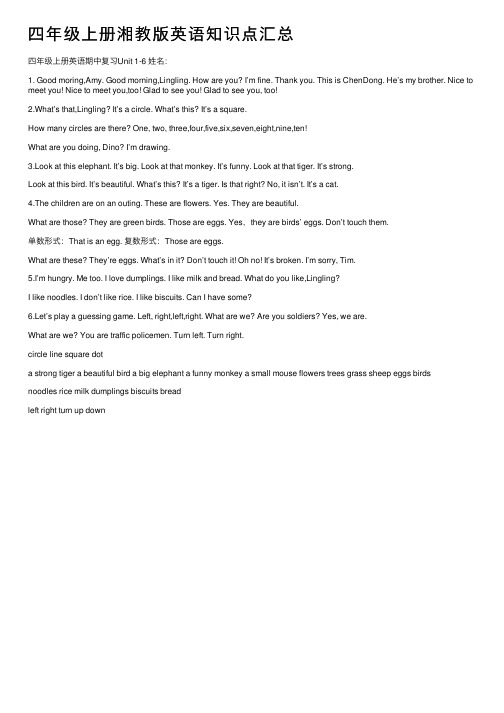
四年级上册湘教版英语知识点汇总四年级上册英语期中复习Unit 1-6 姓名:1. Good moring,Amy. Good morning,Lingling. How are you? I’m fine. Thank you. This is ChenDong. He’s my brother. Nice to meet you! Nice to meet you,too! Glad to see you! Glad to see you, too!2.What’s that,Lingling? It’s a circle. What’s this? It’s a square.How many circles are there? One, two, three,four,five,six,seven,eight,nine,ten!What are you doing, Dino? I’m drawing.3.Look at this elephant. It’s big. Look at that monkey. It’s funny. Look at that tiger. It’s strong.Look at this bird. It’s beautiful. What’s this? It’s a tiger. Is that right? No, it isn’t. It’s a cat.4.The children are on an outing. These are flowers. Yes. They are beautiful.What are those? They are green birds. Those are eggs. Yes,they are birds’ eggs. Don’t touch them.单数形式:That is an egg. 复数形式:Those are eggs.What are these? They’re eggs. What’s in it? Don’t touch it! Oh no! It’s broken. I’m sorry, Tim.5.I’m hungry. Me too. I love dumplings. I like milk and bread. What do you like,Lingling?I like noodles. I don’t like rice. I like biscuits. Can I have some?6.Let’s play a guessing game. Left, right,left,right. What are we? Are you soldiers? Yes, we are.What are we? You are traffic policemen. Turn left. Turn right.circle line square dota strong tiger a beautiful bird a big elephant a funny monkey a small mouse flowers trees grass sheep eggs birdsnoodles rice milk dumplings biscuits breadleft right turn up down。
湘少版 英语四年级上册知识点

四年级上册单词及句型Unit1词汇:are thanks brother sister meet句型:Nice to meet you.Nice to meet you,too.This is Chen Dong.He's my brother.Unit2词汇:line dot sixteen eleven circle square句型:What’s that? It’s a circle.How many squares are there? There are sixteen squares.Unit3词汇:elephant big small monkey tigerstrong beautiful句型:Look at that elephant. Look at this bird.It's beautiful.Is that right? Yes,it is./ No,it isn't.Unit4词汇:children these flower those grass egg sheep 句型:The children are on an outing.What are those? Those are birds' eggs.What are these? These are flowers.Unit5词汇:hungry dumpling bread biscuit noodle rice milk句型:What do you like? I like noodles.I don't like rice. I like biscuits.Unit6词汇:left right turn up down we policemen句型:We are soldiers.Are you soldiers? Yes,we are.Turn left. Turn right.Unit7词汇:whose wallet scarf hat key bag mobile phone句型:Whose is this? I t’s my wallet.Is this your wallet? No, it isn’t.Here you are.Unit8词汇:sweater dancer wear shoes herbrown grey socks skirt句型:Look at the dancer.She wears a white and black sweater.Unit9词汇: wrong forty-six fifty-four twenty thirty forty sixty seventy eighty ninety one hundred homework right句型:Is this right? Yes, it's right.I’m wrong.Forty-six and fifty-four is one-hundred.Unit10词汇:bathroom kitchen welcome our bedroom living room our home come句型:Welcome to our home.This is my bedroom\ living room.That’s my grandparent’s home.Unit11词汇:where under in on table window door desk chair door wall bed room句型:Where's the cat? She is in the kitchen.Is she under the table? No,she isn’t.Unit12词汇:swim fast high run can far jump fly 句型:Peter can swim fast. Anne can jump high.She can run fast. Anne can jump far.It can fly high.。
湘少版版四年级上册英语全册教案(含单元知识点总结)
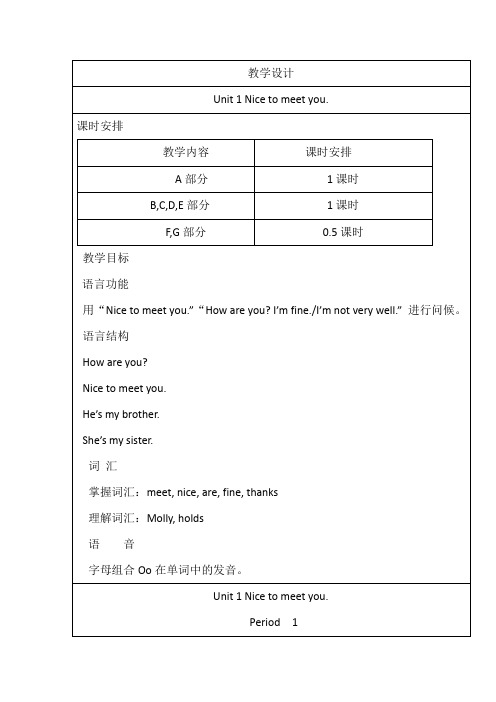
教师将卡片快速闪过,学生说出卡片上的单词,卡片闪过的速度逐渐加快。分组进行比赛。
T:What’s that?
S1:It’s a flag.
T: What’s that?
S2:It’s a ...
1.在游戏的过程中板书句型,并带读。然后让学得快的同学当“小老师”,展示图片,并用“What’s that?”提问。
1创设情景,自由会话。。
情景:你和妈妈在超市碰到了同学。
你和妈妈在公园遇到了邻居。
你和爸爸在书店遇到了老师。
2评价。
Step 5 Homework
家庭作业。听磁带,背课文。
Unit 1Nice to meet you.
Period 2
一、教学目标
1能听懂、会说课文C部分对话;
2能用“This is…”介绍朋友;
四、教学步骤
Step 1 Warming up
1师生问候。
T: Good morning,boys and girls.
Ss:...
T: How are you?
Ss : ...
T: I’m fine, too. Thank you.
2唱英语歌曲“Good morning to you.”。
Step 2 Presentation and drill
Ss: Good morning. /Good afternoon. /Good evening.
2呈现课文。
鼓励学生大胆地说出自己听到的句子,并板书句型Good morning, How are you? I’m fine,thanks.分别用以上句子向学生问候。
游戏-----(锁链游戏)
湘鲁版英语四年级上册复习一
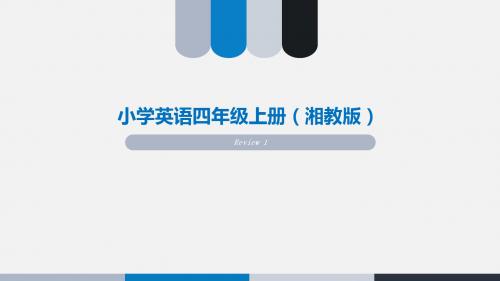
2. Unit 1的复习:
(1)在做过上述活动的基础上,将学生分成小组,小组中每次挑选两个成员, 一个成员就教室的设施、物品发问,另一个成员根据问话进行回答(问答内 容所用词语和句型主要是本单元所学内容,也可以适当穿插一些以前学习的 内容)。
(2)教师放课文Look and listen的录音,让学生仔细听录音,注意录音中 的人物分别说了什么话,听到教室里的哪几种东西。
( 3 )教师放课文中 Look, listen and try 的录音,让学生注意听录音中的 人物对话,然后两人一组表演录音中的对话。此时,教师可以在班里巡回指 导,并挑选表演好的几组来讲台上给全班学生进行对话表演。
3. Unit 2的复习:
(1)教师播放课前制作的课件,课件中有两个学生,他们彼此在借文具用品, 所 用 句 型 分 别 是 : May I use your...? Sure. Here you are. 和 Do you have a/an...? Yes, I do. / Sorry. I don’ t have a/an/any... 等。课 件声像并茂,可以更好地感染学生,提高学习效果。
(2)教师让学生看 Look and listen的教学挂图,注意其中人物谈论的内容 和所用句型。然后,让学生听录音,并说出录音中提到哪些文具用品(要求 学生至少能说出三种)。 ( 3 )教师让学生听 Look, listen and try 的录音,注意其中人物说话所用 的句型和肯定、否定回答。然后,让学生两人一组扮演录音中的人物进行对 话。
It’ s easy/fun!
教学活动
组织学生开展一次个人体育爱好比赛活动,让学生们都亮出自己的“绝技”。 个人体育爱好包括跑步、跳高(跳远)、打乒乓球、打羽毛球、打网球等 (打篮球、踢足球需要多人参加,没有条件的学校或班级可以不设这些项目。 游泳等也受条件限制,可以根据具体情况而定)。然后,挑选出比较好的, 在全班表演(这些体育运动需要在室外进行,教师可以抽出适当时机或专门 找个时间在室外开展比赛活动。但要注意安全,比赛前要对学生进行安全教 育)。
鲁教知识梳理四上
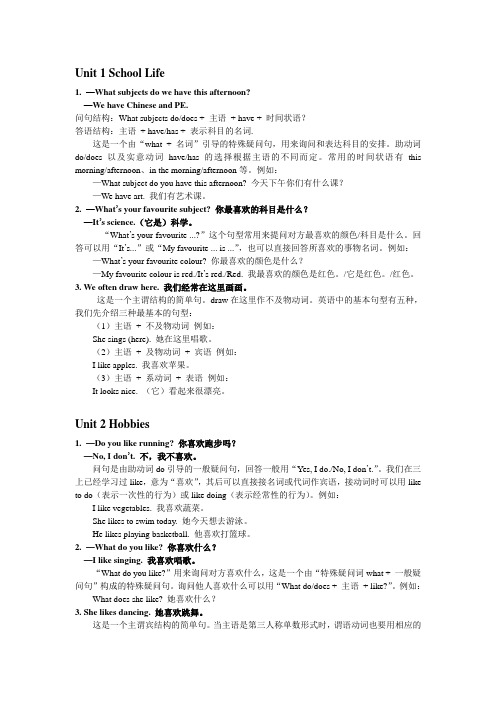
Unit 1 School Life1. —What subjects do we have this afternoon?—We have Chinese and PE.问句结构:What subjects do/does + 主语+ have + 时间状语?答语结构:主语+ have/has + 表示科目的名词.这是一个由“what + 名词”引导的特殊疑问句,用来询问和表达科目的安排。
助动词do/does以及实意动词have/has的选择根据主语的不同而定。
常用的时间状语有this morning/afternoon、in the morning/afternoon等。
例如:—What subject do you have this afternoon? 今天下午你们有什么课?—We have art. 我们有艺术课。
2. —What’s your favourite subject? 你最喜欢的科目是什么?—It’s science.(它是)科学。
“What’s your favourite ...?”这个句型常用来提问对方最喜欢的颜色/科目是什么。
回答可以用“It’s...”或“My favourite ... is ...”,也可以直接回答所喜欢的事物名词。
例如:—What’s your favourite colour? 你最喜欢的颜色是什么?—My favourite colour is red./It’s red./Red. 我最喜欢的颜色是红色。
/它是红色。
/红色。
3. We often draw here. 我们经常在这里画画。
这是一个主谓结构的简单句。
draw在这里作不及物动词。
英语中的基本句型有五种,我们先介绍三种最基本的句型:(1)主语+ 不及物动词例如:She sings (here). 她在这里唱歌。
(2)主语+ 及物动词+ 宾语例如:I like apples. 我喜欢苹果。
最新四年级上册湘教版英语知识点汇总

最新四年级上册湘教版英语知识点汇总1. Good moring,Amy. Good morning,Lingling. How are you? I’m fine. Thank you. This is ChenDong. He’s my brother. Nice to meet you! Nice to meet you,too! Glad to see you! Glad to see you,too!2.What’s that,Lingling? It’s a circle. What’s this? It’s a square.How many circles are there? One,two,three,four,five,six,seven,eight,nine,ten! What are you doing,Dino? I’m drawing.3.Look at this elephant. It’s big. Look at that monkey. It’s funny. Look at that tiger. It’s strong.Look at this bird. It’s beautiful. What’s this? It’s a tiger. Is that right? No,it isn’t. It’s a cat.4.The children are on an outing. These are flowers. Yes. They are beautiful.What are those? They are green birds. Those are eggs. Yes,they are birds’ eggs. Don’t touch them.单数形式:That is an egg. 复数形式:Those are eggs.What are these? They’re eggs. What’s in it? Don’t touch it! Oh no! It’s broken. I’m sorry,Tim.5.I’m hungry. Me too. I love dumplings. I like milk and bread. What do you like,Lingling?I like noodles. I don’t like rice. I like biscuits. Can I have some?6.Let’s play a guessing game. Left,right,left,right. What are we? Are you soldiers? Yes,we are. What are we? You are traffic policemen. Turn left. Turn right.circle line square dota strong tiger a beautiful bird a big elephant a funny monkey a small mouse flowers trees grass sheep eggs birdsnoodles rice milk dumplings biscuits breadleft right turn up down1 / 1。
新湘少版四年级英语上册期末复习知识点

新湘少版四年级英语上册期末复习知识点1. Nice to meet you!一.词汇meet见面brother 哥哥弟弟sister姐姐妹妹cousin堂(表)兄弟姐妹aunt 阿姨伯母姨妈uncle叔叔伯伯舅舅who 谁what什么where哪里name名字he 他she她his他的her她的二.句型1.Nice to meet you! Nice to meet you ,too!很高兴见到你!(初次见面)2.Glad to see you! Glad to see you,too!很高兴见到你!(熟人之间)3.Good morning! 早上好!4.Good afternoon!下午好!5.How are you? I’m fine, Thank you.你好吗?我很好,谢谢你。
6.This is Chen Dong. This is Anne.这是陈东。
这是安妮。
7.He is my brother. She is my sister. It is a dog.他是我的弟弟。
她是我的妹妹。
它是一只狗。
8.Who are you? I’m Lingling.你是谁?我是玲玲。
9.What’s your name? My name is Helen.你叫什么名字?我叫海伦。
10.I’m ten years old.我十岁了。
11.I’m in Class Two, Grade Four.我在四年级二班。
2. It’s a circle.一.词汇circle 圆形square正方形dot点line线triangle三角形rectangle长方形boy男孩girl女孩this这,这个that那,那个me我How many多少二.句型1.What’s this? It’s a circle.这是什么?这是一个圆形。
2.What’s that? It’s a square.那是什么、。
那是一个正方形。
最新湘少版英语四年级上册知识点归纳汇总

Unit 1★动词过去式变化规律:1. 一般情况下,直接在动词词尾加ed. 如:talk—talked说listen—listened听play—played玩climb—climbed爬2. 以不发音的e结尾,在动词词尾加d. 如:practise—practised练习3. 以辅音字母加y结尾的动词,变y为i再加ed. 如:study—studied学习,研究4. 以一个辅音字母结尾的重读闭音节词,双写最后一个辅音字母,再加ed. 如:stop—stopped停止5. 不规则动词没有规律,需要特殊记。
如:do-did have—had go—went learn—learnt take—took read—read speak—spoketeach—taught stand—stood sit—sat say—said run—ranis, am—was are—were write—wrote★单词、短语during 在…期间holiday 假期learn words and sentences学习单词和句子play games玩游戏learn writing学习写作practice listening练习听力★句子时态:一般过去时,表示过去某个时间里发生的动作或存在的状态。
主要由动词的过去式来体现,其标志词是过去的时间。
如:yesterday昨天last night昨晚last week上周last year 去年等等。
1. What did you do during the holidays? 假期间你做了什么?—I read many books./ I learnt writing. / I wrote a little storybook in English./ I visited my grandparents.Unit 2★单词、短语weekday工作日after在…之后before在..之前always总是,经常often时常sometimes有时never从不wave goodbye挥手再见be late for school上学迟到read a newspaper读报纸play chess下棋take a walk散步get up起床have/has breakfast吃早餐return home回家★句子时态:一般现在时:表示经常,反复发生的动作或存在的状态。
湘鲁版四年级英语上册知识点汇总

湘鲁版四年级英语上册知识点汇总四(上)Unit 1What can you see ?一、单词:XXX看见can能够bear熊car小汽车二、重点句子What can you see?你能看见什么?I can see…我能看见…XXX…?有一个…吗?Yes, there is.是的,有。
/ No, there isn’t.不,没有。
三、对话Andy : This is our new classroom.Wang Li :Andy .What can you see ?XXX:I can XXX.Wang Li:What can you see?XXX:I can see many desks.Wang Li: Is there a computer ?Andy : Yes, there is.四(上)Unit 2May I use your crayon?1、单词lesson课程story故事XXX笔记本give给may可以use利用sure固然email电子邮件picture图片good friennds好同伙2、重点句子May Iuse yo ur…?我能用你的…?Sure. Here you are.固然。
给你。
XXX’t have a/ an / any ..对不起,我没有…Let’s write a story.让我们写一个故事吧。
Let’s make a card.让我们做一张卡片吧。
三、对话A: Let’s write a story.B: Ok. Do you have a notebook?A: Yes, I do.B :May I use your pen?A: Sorry, XXX.B: May I use your caryon ?A: Sure. Here you are.B: Thank you.四(上)Unit 3I can run fast.一、单词play玩,打football足球play football踢足球swim泅水easy简单fast快的fun风趣的can’t= can not不克不及2、重点句子Can you…?你能…?Yes, I can.我能/No, I can’t.我不能。
湘少版英语四年级上册知识点汇总
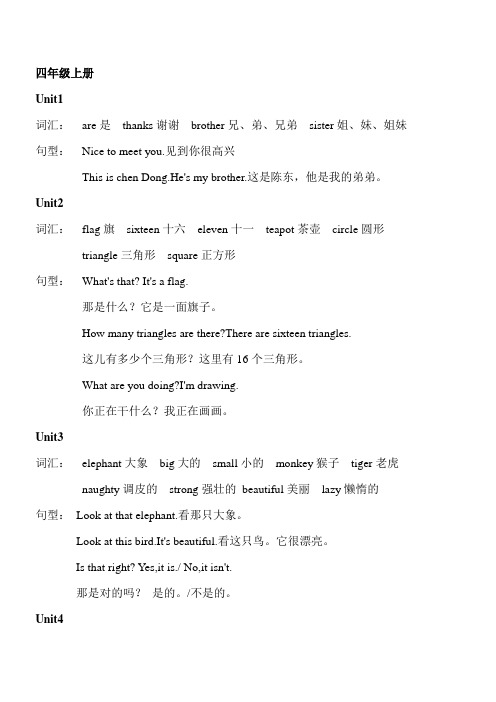
四年级上册Unit1词汇:are是thanks谢谢brother兄、弟、兄弟sister姐、妹、姐妹句型:Nice to meet you.见到你很高兴This is chen Dong.He's my brother.这是陈东,他是我的弟弟。
Unit2词汇:flag旗sixteen十六eleven十一teapot茶壶circle圆形triangle三角形square正方形句型:What's that? It's a flag.那是什么?它是一面旗子。
How many triangles are there?There are sixteen triangles.这儿有多少个三角形?这里有16个三角形。
What are you doing?I'm drawing.你正在干什么?我正在画画。
Unit3词汇:elephant大象big大的small小的monkey猴子tiger老虎naughty调皮的strong强壮的beautiful美丽lazy懒惰的句型:Look at that elephant.看那只大象。
Look at this bird.It's beautiful.看这只鸟。
它很漂亮。
Is that right? Yes,it is./ No,it isn't.那是对的吗?是的。
/不是的。
Unit4词汇:children child的复数outing郊游these这些ladybird瓢虫those那些seagull海鸥egg蛋句型:The children are on an outing.孩子们正在郊游。
What are those?那些是什么?Those are birds' eggs.那些是蛋。
What are these?这些是什么?These are ladybirds.这些是瓢虫。
Don't touch those eggs.别碰那些蛋。
- 1、下载文档前请自行甄别文档内容的完整性,平台不提供额外的编辑、内容补充、找答案等附加服务。
- 2、"仅部分预览"的文档,不可在线预览部分如存在完整性等问题,可反馈申请退款(可完整预览的文档不适用该条件!)。
- 3、如文档侵犯您的权益,请联系客服反馈,我们会尽快为您处理(人工客服工作时间:9:00-18:30)。
湘鲁版四年级英语上册知识点汇总
I can…我会…
I can’t…我不会…
Let’s play…让我们玩…
It’s easy/ hard.这很容易/难。
三、对话
A: XXX.
B: Ok。
Can you play football?
A: Yes。
I can run fast.
B: I can’t play football。
It’s too hard.
A: That’s ok。
Let’s swim instead.
B: Sure。
XXX.
可以吗?
Sure.当然可以。
三、对话
A: What would you like for lunch?
B: I’m XXX。
please.
A: Would you like some water or juice?
B: I’m thirsty。
I’d like some water。
please.
A: Can I get you anything else?
B: No。
thanks。
That’s enough。
I’m home now.
几点了。
What time does the train leave。
火车什么时候开?
XXX…?我能买到去…的票吗?
It’s time to go to…该去…的时候了。
What time is the winter camp。
冬令营什么时候开始?
Excuse me。
what time is the next train to…?对不起,下一班去…的火车是几点?
三、对话
A: Excuse me。
what time is it?
B: It’s 3 o’clock.
A: Thank you。
What time does the train leave for Beijing?
B: It XXX at 5 pm.
A: Can I have a ticket to Beijing。
please?
B: Sure。
Here it is.
A: It’s time to go to the n。
Have fun at the winter camp!
B: XXX.
A: Oh。
right。
Here it is。
What seat number do I have?
B: You have seat number 12.
Is there a train to Beijing at 9:30 am?
Yes。
there is a train to Beijing at 9:30 am。
Dialogue:
A: Andy。
it's time to go to Winter Camp。
B: Okay。
Mum。
What time is it。
A: It's 8 o'clock。
Let's go to the train XXX。
B: Mum。
where is my backpack。
A: Here it is。
B: Thank you。
XXX。
Mum。
A: XXX。
Have fun。
B: Excuse me。
is there a train to Beijing at 9:30 am。
C: Yes。
there is。
Unit 8: Where Are You From?
Canada。
China。
India。
the US。
the UK。
Malaysia。
Japan。
and Italy。
Pizza。
smell。
taste。
durian。
bad。
but。
Key XXX:
Where are you from。
I'm from。
Where is he/she from。
He/She is from。
Dialogue:
A: e to Winter Camp。
B: I'm Mike。
I'm from Canada。
Where are you from。
A: I'm Tim。
I'm from the UK。
B: What's your favourite fruit。
A: XXX XXX。
B: What's a XXX。
A: It's a fruit。
It smells bad but tastes great。
Unit 9: What Are You Doing?
Put。
go home。
sleep。
talk。
put into。
thing。
today。
miss。
next year。
paint。
eat。
Dialogue:
A: What are you doing。
B: I'm XXX。
A: Are you going home。
B: Yes。
I am。
I'm going to sleep。
A: Okay。
XXX。
B: I won't。
I miss them already。
A: Next year。
you can paint a picture for them。
B: That's a good idea。
And I can eat some us food too!
What are you doing right now。
I'm sleeping at the moment。
Can you tell me what he or she is doing。
He or she is eating。
A: What are you doing?
B: I'm packing my bag because I'm going home today.
A: What about Mike。
What's he doing?
B: He'XXX.
A: How about Lali。
What's she up to?
B: XXX.
A: XXX。
XXX.
B: I'll miss you!
A: See you next year.
XXX XXX include "now," "look," and "listen." The structure
of these sentences is "be" (am/is/are) + verb + "-ing." For example。
"I am reading English now" or "The students are drawing pictures now."
There are specific rules for forming the "-ing" form of a verb。
For regular verbs。
you simply add "-ing" to the end of the base verb (e.g。
go-going。
do-doing。
talk-talking。
sing-singing。
eat-eating)。
For verbs that end in an "e," you drop the "e" and add "-ing" (e.g。
write-writing。
drive-driving。
ride-riding)。
For verbs with a stressed。
closed syllable。
you double the final consonant before adding "-ing" (e.g。
swim-swimming。
run-running。
put-putting).。
